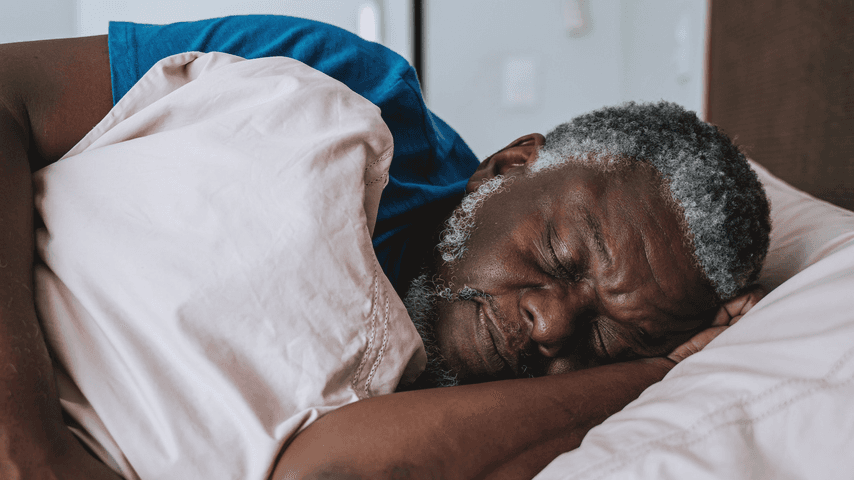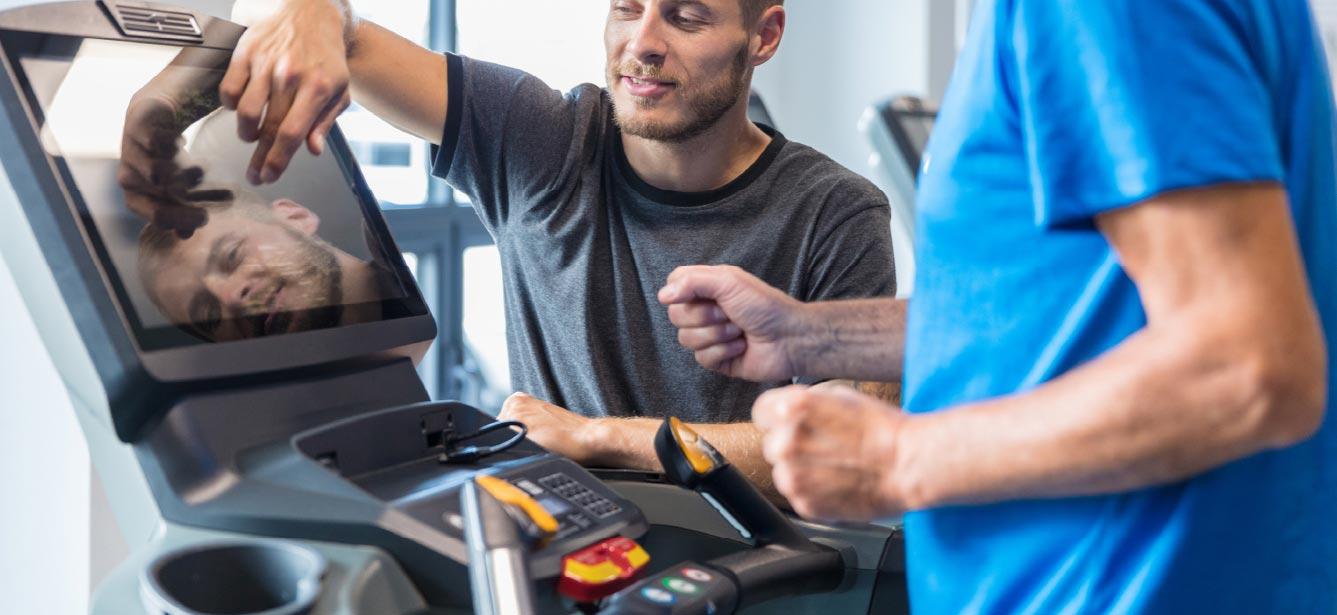
Related Topics
Americans are living longer, which means more time doing the things we love with the people we care about. But that extended lifespan has a flipside: It brings a greater risk of developing one or more chronic health conditions as we enter older adulthood. One of the top chronic diseases facing older Americans today is high blood pressure (hypertension), which impacts nearly 70% of people age 60 and up.1
Here's a surprising fact about high blood pressure: More than 40% of adults with this condition don’t even know they have it.1 The problem isn’t a lack of concern; it’s a lack of clues. Most people with hypertension feel normal—even as elevated pressure quietly damages their blood vessels. That’s why hypertension is often called a “silent killer.”
Read on to learn why high blood pressure rarely causes obvious symptoms, what subtle warning signs may appear, and when to seek medical help.
What are subtle, silent signs and symptoms of high blood pressure?
Most people experience no symptoms at all, which makes regular screening critical. But if you have very high blood pressure or a sudden spike, you may notice one or more of the following signs:
- Early-morning headaches: Persistent, dull headaches felt at the back of your skull when you wake up can be related to elevated nighttime blood pressure. These headaches are more common when your blood pressure rises rapidly or reaches severe levels.
- Dizziness or light-headedness: High blood pressure can reduce blood flow to your brain and leave you woozy.
- Blurred vision or eye strain: Your eyes contain delicate blood vessels. Over time, uncontrolled hypertension can damage the retina, causing blurred or double vision and even vision loss. Regular eye exams sometimes reveal high blood pressure before other tests do.
- Pounding sensation in your ears, neck, or chest: This may be the result of greater pressure from blood flowing through your arteries—especially if you’re having other symptoms.
- Shortness of breath: Extra pressure in your blood vessels forces the heart to pump harder, which may cause you to get winded easily during physical activities.
- Nosebleeds: Occasional nosebleeds are usually nothing to worry about. But frequent or unexplained episodes can accompany sudden spikes in blood pressure. Though not a reliable early sign, repeated nosebleeds warrant a blood pressure check.
- Fatigue or confusion: Uncontrolled hypertension can impair blood flow to your brain, leading to persistent tiredness, trouble concentrating, or even episodes of confusion.
- Irregular heartbeat (palpitations): High blood pressure can enlarge or strain your heart muscle, contributing to atrial fibrillation or other arrhythmias. This can feel like your heart fluttering, racing, or skipping beats.
- Tinnitus: Tinnitus is defined as recurring ringing, buzzing, or roaring in one or both ears. In a 2021 study, researchers found that 45.8% of people with hypertension also had tinnitus (compared to 39.2% of people who did not have hypertension).2 While tinnitus has many causes, new or worsening ear noise is another cue to check your numbers.
Why does hypertension often have no symptoms?
High blood pressure—when the force of blood against your artery walls is consistently too high—doesn’t produce symptoms on its own. Rather, this excess pressure builds up slowly over the years, gradually causing tiny tears in artery linings. Fats and cholesterol can stick to these damaged areas and accumulate, leading to plaque formation and a narrowing of the vessels. This restricts the flow of blood throughout your body and places extra strain on your heart, which has to work harder to pump blood.
Clearing confusion about high blood pressure
High blood pressure is:
- Not caused by stress. Even though stressful situations can cause a temporary rise in blood pressure, stress alone does not cause longlasting, or chronic, hypertension.
- Not caused by aging. The risk for high blood pressure rises with age, but people of all ages can have high blood pressure.
- A 'silent' disease. There are typically no warning signs or symptoms.
You might have heard of "white coat syndrome" where your blood pressure is high at a doctor visit but normal at home. Some research has found this isn't necessarily harmless and might point to a higher risk of developing hypertension within 10 years.3 It's worth a talk with your doctor to see if you need to be watching your numbers more closely.
Who is most likely to have silent high blood pressure?
Because most people with high blood pressure have no symptoms at all, it's easy to go undiagnosed. Some of the things that raise your risk for having high blood pressure include: a family history of hypertension; having a chronic condition such as diabetes, high cholesterol, or kidney disease; and being overweight or obese. Cigarette smoking, alcohol use, and a high-salt diet are known as "modifiable" or "lifestyle" factors linked not just to high blood pressure but other health issues such as heart attack and cancer.4
Also, 58% of non-Hispanic Black adults in the U.S. have high blood pressure, compared to the overall U.S. adult rate of 44.5%. It's unclear why rates are higher for Black adults. But they also have higher rates of more severe high blood pressure and tend to develop the condition earlier in life, according to the American Heart Association.5
Regular blood pressure checks are vital, even without symptoms
Even with no symptoms, older adults should have their blood pressure checked at least once a year. “Hypertension can affect anyone,” Leigh Simmons, MD, a general internist, explained in a Mass General Brigham Newsroom article. “The number one risk factor for whether you will develop hypertension is your family history of hypertension or high blood pressure.”
The only reliable way to know your blood pressure numbers is to check them routinely. Your doctor may suggest more frequent monitoring if you:
- Have parents, siblings, and/or grandparents who have hypertension
- Have repeated readings above 120/80 mmHg
- Live with diabetes, kidney disease, or heart issues
- Take medications known to raise blood pressure
- Experience any of the subtle signs described above
Below are some easy ways to stay on top of your numbers:
- Yearly wellness visits: It’s common to have your blood pressure checked at every health care appointment. But if it gets overlooked by your provider, don’t be afraid to ask! You are your best advocate.
- Home monitoring: Automatic cuff monitors let you track trends in your blood pressure readings—and our testing found these are some of the best blood pressure monitors for home use. Record your results in a notebook or smartphone app and share them with your provider at your next visit.
- Pharmacy machines: Many grocery or drugstores offer free walk-up stations. These are perfect for quick checks while you’re shopping or waiting for your prescriptions to be filled.
If your readings are consistently elevated (above 120/80 mmHg), schedule an appointment with your health care provider. Early detection and treatment are your best defense against heart attack, stroke, kidney failure, and vision loss.
Frequently asked questions
What are the signs and symptoms of high blood pressure in older adults?
High blood pressure rarely causes pronounced symptoms, which is why it’s called a “silent killer.” But some older adults may experience easy-to-miss signs such as early-morning headaches, blurred vision, dizziness, or fatigue—especially when blood pressure is very high or rising quickly.
Can high blood pressure make you feel tired or dizzy?
Yes, high blood pressure can sometimes cause fatigue or dizziness, especially if it’s very high or fluctuating. These symptoms can also be related to medications or other health conditions, so it’s important to discuss them with your health care provider.
What should I do if my blood pressure is high but I feel fine?
Even if you feel ok, consistently high blood pressure still increases your risk of heart disease, stroke, and other serious health conditions. Don’t ignore elevated readings—track them and share your results with your doctor.
What are emergency symptoms of dangerously high blood pressure?
Seek immediate medical attention if you experience symptoms like chest pain, severe headache, vision changes, shortness of breath, confusion, or nausea along with a blood pressure reading over 180/120 mmHg. These could be signs of a hypertensive crisis, which can lead to loss of consciousness, stroke, heart attack, and other life-threatening issues.
How often should you check your blood pressure?
Older adults should check their blood pressure at least once a year during routine checkups. If you have elevated readings or risk factors, your doctor may recommend checking more frequently—either at home, in a pharmacy, or during regular medical visits.
Sources
1. Centers For Disease Control and Prevention. Hypertension Prevalence, Awareness, Treatment, and Control Among Adults Age 18 and Older: United States, August 2021–August 2023. October 2024. Found on the internet at https://www.cdc.gov/nchs/products/databriefs/db511.htm
2. Alessandra Giannella Samelli, et al. Hearing loss, tinnitus, and hypertension: analysis of the baseline data from the Brazilian Longitudinal Study of Adult Health (ELSA-Brasil). Clinics (São Paulo). March 19, 2021. Found on the internet at https://pmc.ncbi.nlm.nih.gov/articles/PMC7978663/
3. Rush. High Blood Pressure Myths. Found on the internet at https://www.rush.edu/news/high-blood-pressure-myths
4. World Health Organization. Hypertension Key Facts. Found on the internet at https://www.who.int/news-room/fact-sheets/detail/hypertension
5. American Heart Assocaition. High Blood Pressure Among Black Adults. Found on the Internet at https://www.heart.org/en/health-topics/high-blood-pressure/know-your-risk-factors-for-high-blood-pressure/high-blood-pressure-among-black-adults



